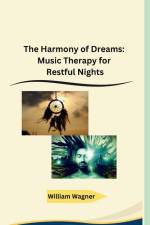av William Wagner
329,-
Sleep disorders are a common occurrence in today's fast-paced world, where stress and anxiety often take a toll on our ability to get a good night's sleep. In this subchapter, we will explore the various types of sleep disorders and how music therapy can be an effective tool in managing and treating these conditions.Insomnia, the most prevalent sleep disorder, affects millions of people worldwide. It is characterized by difficulty falling asleep, staying asleep, or waking up too early. Insomnia can be caused by a multitude of factors, including stress, anxiety, depression, or even certain medications. The soothing power of music can help calm the mind, promoting relaxation and reducing anxiety levels, which in turn aids in falling asleep faster and staying asleep throughout the night.Another common sleep disorder is sleep apnea, a condition where breathing repeatedly stops and starts during sleep. This disruption not only affects the quality of sleep but also poses serious health risks. Music therapy, specifically the use of calming melodies and rhythms, can help regulate breathing patterns and promote a more restful sleep for individuals with sleep apnea.Restless Leg Syndrome (RLS) is a neurological disorder characterized by an irresistible urge to move the legs, often accompanied by uncomfortable sensations. RLS can severely disrupt sleep and lead to daytime fatigue. Music therapy, with its ability to distract the mind and induce relaxation, can provide relief from the discomfort associated with RLS, allowing for a more restful sleep.Additionally, music therapy has shown promising results in managing sleep disorders such as narcolepsy, a condition characterized by excessive daytime sleepiness and sudden, uncontrollable episodes of falling asleep. By incorporating rhythmic and stimulating music, individuals with narcolepsy can experience increased alertness and improved wakefulness throughout the day.Understanding the power of music in promoting restful nights is crucial for everyone, regardless of whether they suffer from a sleep disorder or not. Incorporating soothing melodies and calming rhythms into our bedtime routine can help create a peaceful environment conducive to sleep. By utilizing the healing power of music, we can all experience the benefits of a good night's sleep, leading to improved overall well-being and a more harmonious life.


